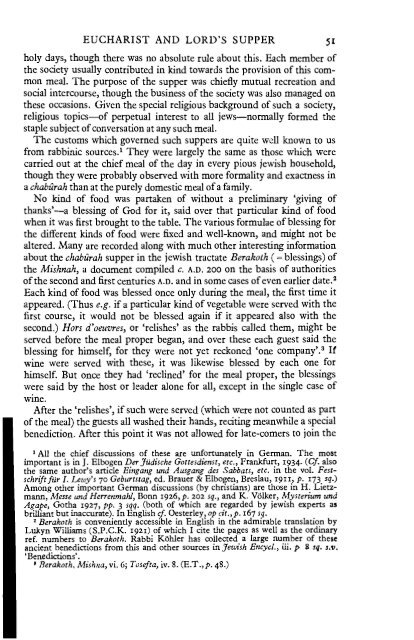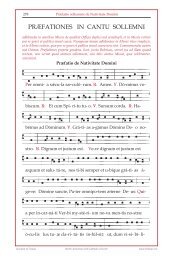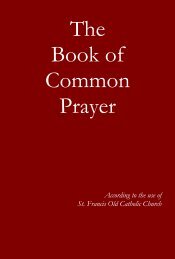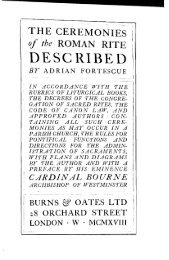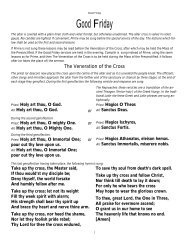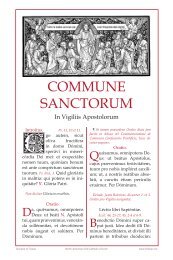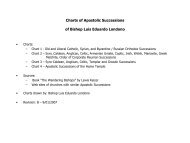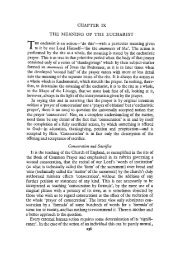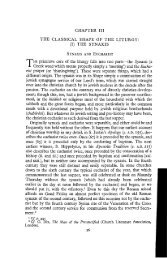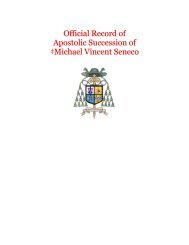Eucharist and Lord's Supper
Eucharist and Lord's Supper
Eucharist and Lord's Supper
Create successful ePaper yourself
Turn your PDF publications into a flip-book with our unique Google optimized e-Paper software.
EUCHARIST AND LORD'S SUPPER 51<br />
holy days, though there was no absolute rule about this. Each member of<br />
the society usually contributed in kind towards the provision of this common<br />
meal. The purpose of the supper was chiefly mutual recreation <strong>and</strong><br />
social intercourse, though the business of the society was also managed on<br />
these occasions. Given the special religious background of such a society,<br />
religious topics-of perpetual interest to all jews-normally formed the<br />
staple subject of conversation at any such meal.<br />
The customs which governed such suppers are quite well known to us<br />
from rabbinic sources. l They were largely the same as those which were<br />
carried out at the chief meal of the day in every pious jewish household,<br />
though they were probably observed with more formality <strong>and</strong> exactness in<br />
a chabUrah than at the purely domestic meal of a family.<br />
No kind of food was partaken of without a preliminary 'giving of<br />
thanks'-a blessing of God for it, said over that particular kind of food<br />
when it was first brought to the table. The various formulae of blessing for<br />
the different kinds of food were fixed <strong>and</strong> well-known, <strong>and</strong> might not be<br />
altered. Many are recorded along with much other interesting information<br />
about the chabUrah supper in the jewish tractate Berakoth (= blessings) of<br />
the Mishnah, a document compiled c. A.D. 200 on the basis of authorities<br />
of the second <strong>and</strong> first centuries A.D. <strong>and</strong> in some cases of even earlier date. 2<br />
Each kind of food was blessed once only during the meal, the first time it<br />
appeared. (Thus e.g. if a particular kind of vegetable were served with the<br />
first course, it would not be blessed again if it appeared also with the<br />
second.) Hors d'oeuvres, or 'relishes' as the rabbis called them, might be<br />
served before the meal proper began, <strong>and</strong> over these each guest said the<br />
blessing for himself, for they were not yet reckoned 'one company'.3 If<br />
wine were served with these, it was likewise blessed by each one for<br />
himself. But once they had 'reclined' for the meal proper, the blessings<br />
were said by the host or leader alone for all, except in the single case of<br />
wine.<br />
After the 'relishes', if such were served (which were not counted as part<br />
of the meal) the guests all washed their h<strong>and</strong>s, reciting meanwhile a special<br />
benediction. After this point it was not allowed for late-comers to join the<br />
1 All the chief discussions of these are unfortunately in German. The most<br />
important is in J. Elbogen Der Judische Gottesdienst, etc., Frankfurt, 1934. (ef. also<br />
the same author's article Eingang und Ausgang des Sabbats, etc. in the vol. Festschriftfur<br />
I. Lewy's 70 Geburtstag, ed. Brauer & Elbogen, Breslau, 19II, p. 173 sq.)<br />
Among other important German discussions (by christians) are those in H. Lietzmann,<br />
Messe und Herrenmahl, Bonn 1926, p. 202 sq., <strong>and</strong> K. Volker, Mysterium und<br />
Agape, Gotha 1927, pp. 3 sqq. (both of which are regarded by jewish experts as<br />
brilliant but inaccurate). In English cf. Oesterley, op cit., p. 167 sq.<br />
• Berakoth is conveniently accessible in English in the admirable translation by<br />
Lukyn Williams (S.P.C.K. 1921) of which I cite the pages as well as the ordinary<br />
ref. numbers to Berakoth. Rabbi KoWer has collected a large number of these<br />
ancient benedictions from this <strong>and</strong> other sources in Jewish Encycl., iii. p. 8 sq. S.tI.<br />
'Benedictions'.<br />
• Berakoth, Mishna, vi. 6; Tosefta, iv. 8. (E.T.,p. 48.)


